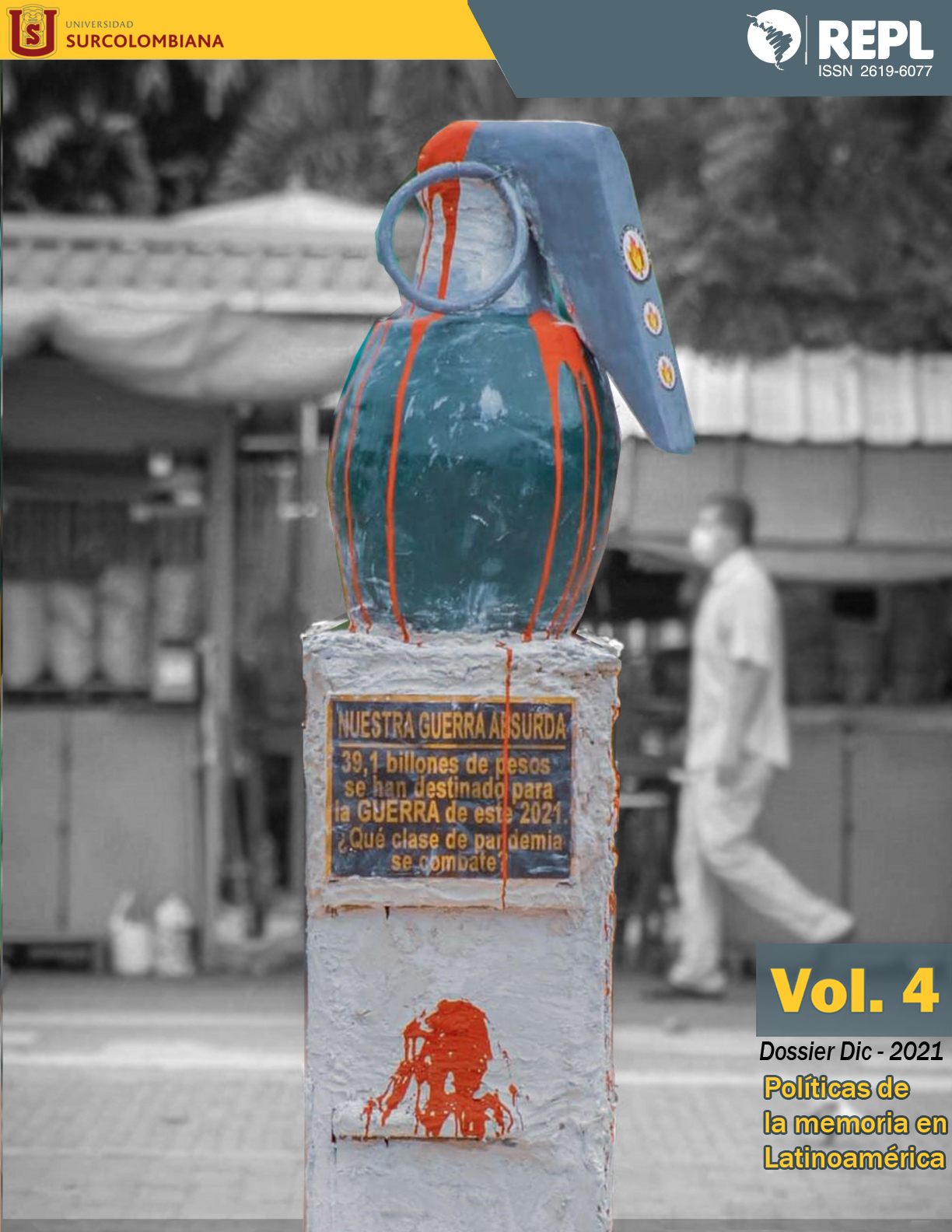Historical Memory in Colombia:
Field and tension.
##plugins.themes.bootstrap3.article.main##
In Colombia, the work of recovering the past of the conflict, its preservation, and even its treatment as a neuralgic element for clarifying the truth have been organized around what has been conceptually called the “field of historical memory.” Not in a few publications, the emergence of this field has been mentioned to account for the processes placed in it, the relationships that are established between those who are compelled in their intervention, and the phenomena that derive from there. However, given the breadth of works gathered on this particular topic, it is difficult to formally identify what is referred to when talking about the field of historical memory in Colombia since the elements that are considered in the different formulations of the authors vary or are treated in different ways according to the interpretative frameworks, theoretical-conceptual approaches, and the epistemic scaffolds from which the phenomenon is approached. In this sense, the purpose of this article tries to make formalization of this field, from a reflection that takes as its articulating axis, the theory of the social fields of P. Bourdieu, which allows giving consistency to a specifically delimited space and allows the analysis of the action, relationship and tension between particular agents, who occupy specific and dynamic places, within the framework of the construction of historical memory in the Colombian case.
Downloads
##plugins.themes.bootstrap3.article.details##
Acevedo, O. (2012). Geografías de la Memoria: Posiciones de las víctimas en Colombia en el periodo de justicia transcicional (2005-2010) (1st ed.). Pontificia Universidad Javeriana.
Arboleda-Ariza, J. C., Piper, I., & Bravo, G. P. (2020). Reparation policies in Colombia : Memory as a Repertoire. December. https://doi.org/10.1177/1750698020982036
Bautista, D. (2015). Reflexión sobre el papel de los actores en el conflicto armado en Colombia y la importancia de la memoria histórica para la construcción de paz. Trans-Pasando Fronteras, 8, 73. https://doi.org/10.18046/retf.i8.2086
Berón, A., & Martínez, L. (2020). Aportes al campo de la memoria, la verdad y el esclarecimiento desde la historia. Ciencia Nueva, 4, 97–101. https://doi.org/: https://doi.org/10.22517/25392662.24633
Bourdieu, P., & Wacquant, L. (1992). Una invitación a la sociología reflexiva (Siglo XXI Editores Argentina S.A. (ed.); 1st ed., Vol. 1). Siglo XXI. http://www.redmovimientos.mx/2016/wp-content/uploads/2016/10/Bourdieu-P.-Wacquant-L.-2005.-Una-invitación-a-la-sociología-reflexiva.-Editorial-Siglo-XXI.pdf
Cancimance López, A. (2013). Memoria Y Violencia Política En Colombia Political Memory and Violence in Colombia. Rev. Eleuthera, 9, 13–38. http://vip.ucaldas.edu.co/eleuthera/downloads/Eleuthera9_3.pdf
Centro Nacional de Memoria Histórica. (2014). Memoria histórica en el ámbito territorial: orientaciones para autoridades territoriales. www.centrodememoriahistorica.gov.co
Ley 1448 de 2011, 75 (2011).
Criado, E. M. (2008). El concepto de campo como herramienta metodológica. Reis, 123, 11. https://doi.org/10.2307/40184891
Delahanty Matuk, G. (1996). Atmosfera social y cambio. Contribuciones de Kurt Lewin a la psicologia social. Tramas, 10, 51–78.
ElEspectador. (2020a). Centros de investigación rechazan convocatoria del Centro de Memoria Histórica. El Espectador. https://www.elespectador.com/colombia2020/justicia/verdad/centros-de-investigacion-rechazan-convocatoria-del-centro-de-memoria-historica-articulo-910117
ElEspectador. (2020b). La información que falta en el libro entregado por Fedegán para hacer memoria. El Espectador. https://www.elespectador.com/colombia2020/pais/la-informacion-que-falta-en-el-libro-entregado-por-fedegan-para-hacer-memoria-articulo-906999
Fernández Fernández, J. M., & Puente Ferreras, A. (2009). The notion of field in Kurt Lewin and Pierre Bourdieu: a comparative analysis. 127, 33–53.
Galeano Acosta, L. M. (2017). Estado del arte de los estudios sociales sobre la Memoria del conflicto armado en Colombia 2005-2015 [Univesridad EAFIT]. In Universidad EAFIT. https://doi.org/10.1017/CBO9781107415324.004
Gamboa, W., Loaiza, M., & Roa, J. (2015). Memoria histórica y patrimonio cultural: su contribución a la restauración del tejido social, en un escenario de post conflicto en Colombia. In cátedra unesco y cátedra infancia justicia transicional y memoria histórica (p. 432). Universidad Externado de Colombia.
GMH. (2013). ¡Basta Ya! Colombia: Memorias de guerra y dignidad. In A. Calle, M. Carvajal, F. Thaine, I. Tania, & P. Nieto (Eds.), Latinos at the Golden Gate. Imprenta Nacional. https://doi.org/10.5149/northcarolina/9781469607665.003.0006
Marín, J. J. (2012). El libro La Violencia en Colombia (1962-1964). Radiografía emblemática de una época tristemente célebre. Revista Colombiana de sociología, 35(2), 35-66.
Jaramillo Marin, J., Berón Ospina, A. A., & Parrado Pardo, E. P. (2020). Disruptive perspectives in the memory field in Colombia. Utopia y Praxis Latinoamericana, 25(Extra4), 162–175. https://doi.org/10.5281/zenodo.3931063
Lewin, K. (1988). La teoria del campo en la ciencia social. Paidós.
Lifschitz, J. A. (2012). La memoria social y la memoria política. Aletheia, 3.
Llancaqueo, A., Caballero, M. C., & Moreira, M. A. (2003). El aprendizaje del concepto de campo en física: una investigación exploratoria a luz de la teoría de Vergnaud. Revista Brasileira de Ensino de Física, 25(4), 399–417. https://doi.org/10.1590/s1806-11172003000400011
Lopez, M. (2014). Campo de informatica. https://marialopezmarieh.wordpress.com/2014/04/09/campo-de-informatica/
Martínez Volkmar, J. J. (2017). Jurisdicción especial para la paz y su relevancia en la convulsa coyuntura política colombiana. Ratio Juris, 12(25), 131–150. https://doi.org/10.24142/raju.v12n25a7
Decreto 4803 Estructura del Centro de Memoria Histórica., (2011). http://www.centrodememoriahistorica.gov.co/descargas/decretos/DECRETO_DE-ESTRUCTURA_DEL_CENTRO.pdf
Nuñez Leiva, I. (2010). Elementos básicos de la Teoría de los campos sociales de Pierrer Bourdieu. Apuntes para estudiantes y docentes de Derecho. ARS BONI ET AEQUI, 7, 209–219.
Quishpe, R. (2018). Los excombatientes y la memoria: tensiones y retos de la memoria colectiva construida por las FARC en el posconflicto colombiano. Análisis Politico, 93, 93–114.
Romero, G. R., Castaño, P. J., & Zapata, D. C. (2020). Representational distance between expert narration and local accounts: A reflection on the politics of evidence in the field of memory in Colombia. Antipoda, 2020(41), 103–124. https://doi.org/10.7440/antipoda41.2020.05
Semana. (2020). Retirarán del Centro de Memoria archivos de 25 años de guerra en Colombia. Revista Semana. https://www.semana.com/nacion/articulo/retiraran-del-centro-de-memoria-archivos-de-25-anos-de-guerra-en-colombia/654616
Torres Ávila, J. (2013). La memoria historica y las victimas. Juridicas, 10(2), 144–166.
Vélez Villafañe, G. (2012). Pedagogías de las memorias de la historia reciente colombiana: ¿construir memoria, en el campo de una memoria imposible? Revista Colombiana de Educación, 62, 245. https://doi.org/10.17227/01203916.1638
Zuluaga, M. (2014). Las memorias que seremos. Memoria y olvido en el discurso oficial sobre el conflicto armado colombiano en el pasado reciente. Aletheia, 5(9), 1-5.




